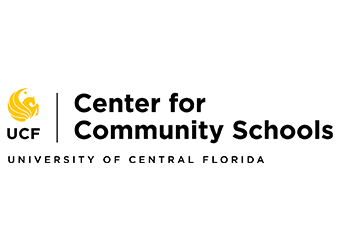 By partnering a school district with a university or college, nonprofit agency, and healthcare provider among other partners, schools can address the holistic needs of students with wrap-around services and support that promotes lifelong success.
By partnering a school district with a university or college, nonprofit agency, and healthcare provider among other partners, schools can address the holistic needs of students with wrap-around services and support that promotes lifelong success.
On April 2, Donnie Hale, Assistant Director, and Robert Palmer, University Assistance Coordinator with the Center for Community Schools at the University of Central Florida, joined Kathy McDonald, FCAN’s Assistant Director for Network Partnerships, to share what it means to be a community school and the supports the center provides to schools making the transition.
Get to Know: Community Partnership Schools
A “community school” is both a physical place, as well as a set of partnerships between a school and other community resources. These long-term partnerships also cultivate community involvement where community members can see the importance and impact of a community-supported school.
UCF’s Center for Community Schools provides supports for communities interested in the community partnership approach by offering technical assistance, university-assisted partnership, training and development and assessment and evaluation.
Community Partnership Schools in Florida
Florida has over 20 schools that are either planning or implementing the Community Partnership School model. The four pillars that are key to implementing a partnership school are:
- Collaborative Leadership
- Expanded Learning Time and Opportunities
- Wellness Supports
- Family and Community Engagement
By connecting leaders who bring a culture of shared governance and collective decision-making, these partners anchor the school as a community asset and a place for holistic support. This includes expanding learning opportunities for students before and after school, on weekends and during the summer, as well as offering access to a range of health and social services that are provided on the school’s campus.
The school sees families and communities as partners in student success and orients the school as a neighborhood center that also provides adult enrichment opportunities and parent support.
What is the impact of Community Partnership Schools?
During the webinar, Hale and Palmer offered examples of what’s possible through this approach.
The duo shared information about the progress Evans High School in Orlando has seen since becoming a Community Partnership School. Evans High’s graduation rates have increased from 64% in 2010-11 to 88% in 2018-19. Annual community crime reports have decreased from a high of 101 in 2016 down to 42 in 2018.
Additionally, the Orange County Public Schools Academic Center for Excellence (OCPS ACE) saw a 71% decrease in discipline-based referrals during the 2018-19 academic year, while The Children’s Aid Society found that for every $1 invested in a community school, the benefit over time is $9.90.
Show Notes
To learn more about the Community Partnership School model — or to view the webinar and download the presentation — take advantage of these resources:
Be sure to visit our Past Webinars page for access to recordings and downloadable material from FCAN’s previous presentations.
